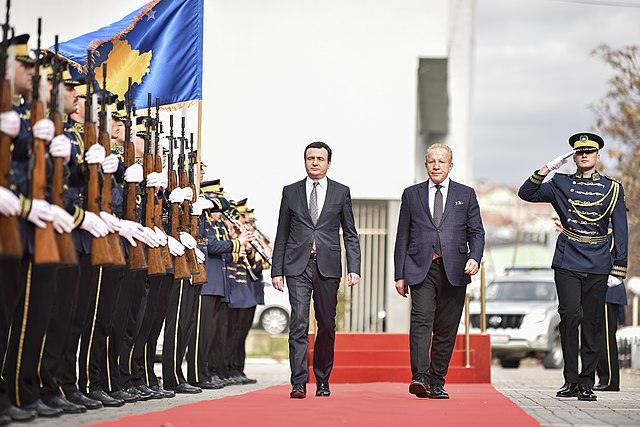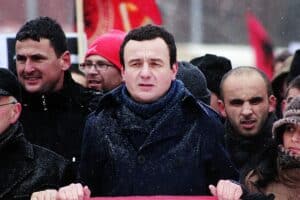In northern Kosovo, violence erupted last month following local elections in four municipalities. At least 25 UN-peacekeeping force soldiers were injured during riots. Unusually, several of its most important allies have blamed Pristina for the unrest. In this article, five questions about the situation in Kosovo will be answered.
What happened during the riots in northern Kosovo?
The violent riots of late cannot be separated from the months of unrest surrounding local elections in the four municipalities that form the region North Kosovo: North Mitrovica, Leposavić, Zvečan and Zubin Potok. The elections – which were held in late April – were boycotted by the pro-Serbian party Srpska Lista. The boycott was largely followed by the ethnically Serb population, which resulted in an extremely low voter turnout of 3,47% (1,567 out of 45,095 citizens allowed to vote).
Despite this alarmingly low turnout, the government in Pristina – led by Prime Minister Albin Kurti of the Vetëvendosje party – decided to move along with the results. Vetëvendosje won in North Mitrovica and Leposavic, while the opposition Democratic Party of Kosovo achieved victory in Zvečan and Zubin Potok. Protests from pro-Serbian political leaders began with the swearing-in of Erden Atiq – the designated mayor of North Mitrovica – with the pro-Serbian leaders branding it an “invasion of the north.” The remaining three mayors were sworn in on 25 May.
One day later – as the newly sworn in mayors attempted to enter their offices – it became clear that the ethnically Serb population would not simply leave it at that: protestors clashed with police escorting the mayors. Five policemen were injured as a result. Attempts by the US and several EU countries to de-escalate would prove to be futile, as a large-scale clash with police and the NATO-led peacekeeping force KFOR occurred on 29 May. No less than 25 KFOR-soldiers and 50 protestors were wounded during these riots. Journalists were reportedly attacked as well by the protestors. Some masked protestors were even seen spray-painting the letter “Z” – a symbol of support for the Russian invasion of Ukraine – on buildings and vehicles.
What has happened in the weeks since the riots?
In the first days after the violent riots, protests continued in three municipalities. An ethnic Albanian group of protestors – which responded to anonymous online calls for “a march to the North” – was urged to stop by Kosovo’s Interior Minister Xhelal Svecla. Meanwhile, Turkish forces arrived in the region to support the KFOR peacekeeping force.
While tensions remain high, there have been no incidents similar to the riots on 29 May. Kosovan Prime Minister Albin Kurti – on 13 June – issued a five-point plan for de-escalation in the region. Cornerstones were the suggestion of early elections in the four municipalities, prosecution of violent protestors, and security assessments every 15 days by Kosovo police, KFOR, and EULEX. On the same day, however, the Kosovan government announced the arrest of Milun Milenkovic, who is accused of being involved in the 29 May-riots. Police reportedly used tear gas during the arrest, which was observed by dozens of civilians.
Last week, a new possible source of conflict emerged as three Kosovan police officers were detained by Serbia. Both countries shared conflicting accounts on the arrest, with Kosovo claiming the officers were kidnapped from Kosovan territory and Serbia claiming the officers were arrested in Serbian territory. Pristina has demanded the immediate release of the detained officers, while also tightening its border control. Belgrade, meanwhile, has started an investigation into the officers and a court has already ordered the detention of the officers.
How has Serbia reacted to the unrest?
On 26 June – when protests in northern Kosovo started – Serbian President Aleksandar Vučić reacted swiftly by placing the countries’ military on full combat alert. Some military units, moreover, were ordered to move closer to the Kosovan border. Subsequently, Vučić disclosed a statement on Instagram urging Pristina to “meet its commitments” – like the establishment of a community for Serbian municipalities – while also prompting ethnic Serbs in North Kosovo to vote in upcoming elections.
The response of Vučić to the unrest in Kosovo should be seen in the light of large-scale protests in his own country. The Serbian President is facing the biggest criticism in his decade-long rule, which was triggered by two mass shootings in May. Protestors blame the shootings on Vučić and his government, which is said to promote a “culture of violence”. Tensions in Kosovo – according to Milomir Mandic of research group Demostat – are an advantage to Vučić as it plays into his image of defender of Serbs and Serbian interests.
How has the international community reacted to the unrest?
Already before the eruption of violence on 29 May, Prime Minister Kurti’s government was warned – in a joint statement – by the US, Germany, France, the UK, and Italy. “We condemn Kosovo’s decision to force access to municipal buildings in northern Kosovo despite our call for restraint.” The five countries fear that the events might lead to a renewed flaring up of tensions between Kosovo and its neighbor Serbia.
Dissatisfaction among the US and the four European countries only grew after the events of 29 May. A day after the riots, Jeffrey Hovenier – the US ambassador to Kosovo – announced that Pristina’s participation in a US-led military exercise was cancelled. The US, furthermore, will cease to support Kosovo in its fight to gain recognition of its independence from the international community.
This sentiment was echoed by French President Emmanuel Macron: “We very clearly notified the Kosovan authorities that it was a mistake to proceed with these elections.” On 14 June, the member states of the EU unanimously voted to take “temporary and reversible” measures, of which the persistence is depending on Pristina’s future handling of the situation.
Russia – on the other hand – supports the pro-Serbian protestors. “We support Serbia and the Serbs unconditionally… We consider that all legal rights and interests of the Kosovo Serbs must be observed,” said Kremlin spokesman Dmitry Peskov.
How will the situation develop?
International observers are hopeful to reach a solution in the coming months. Under heavy pressure from its Western allies, it is likely that Kosovan authorities will go ahead with new elections in northern Kosovo’s four municipalities. While Serbia will undoubtedly remain a destabilizing factor in the region, increased interference from Belgrade is still unlikely. Any Serbian military aggression faces the obstacle of the international peacekeepers that are stationed there.
Author: David Groenen



